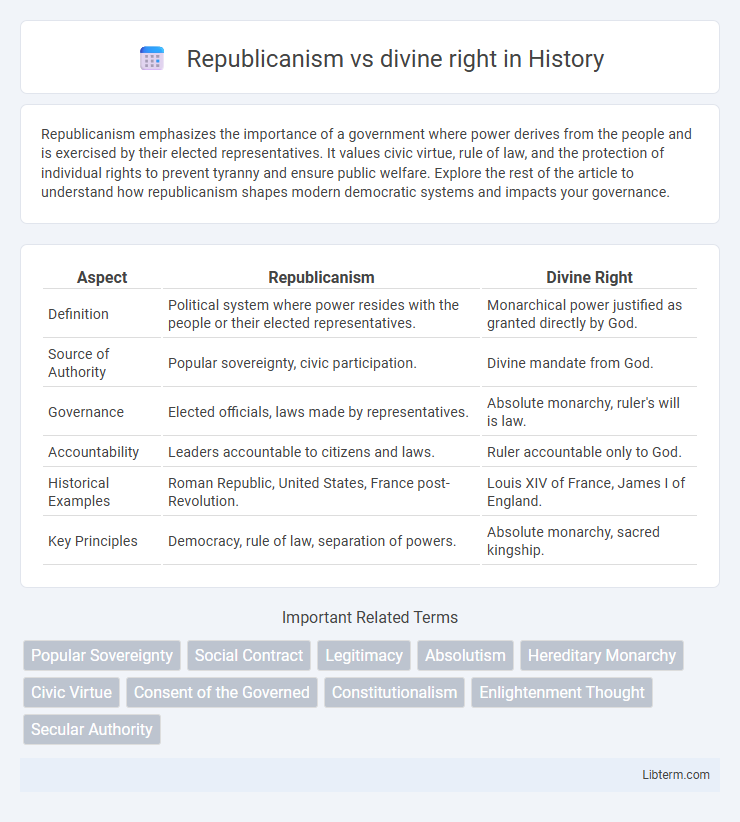Republicanism emphasizes the importance of a government where power derives from the people and is exercised by their elected representatives. It values civic virtue, rule of law, and the protection of individual rights to prevent tyranny and ensure public welfare. Explore the rest of the article to understand how republicanism shapes modern democratic systems and impacts your governance.
Table of Comparison
| Aspect | Republicanism | Divine Right |
|---|---|---|
| Definition | Political system where power resides with the people or their elected representatives. | Monarchical power justified as granted directly by God. |
| Source of Authority | Popular sovereignty, civic participation. | Divine mandate from God. |
| Governance | Elected officials, laws made by representatives. | Absolute monarchy, ruler's will is law. |
| Accountability | Leaders accountable to citizens and laws. | Ruler accountable only to God. |
| Historical Examples | Roman Republic, United States, France post-Revolution. | Louis XIV of France, James I of England. |
| Key Principles | Democracy, rule of law, separation of powers. | Absolute monarchy, sacred kingship. |
Defining Republicanism: Core Principles
Republicanism centers on the principle of popular sovereignty, where the authority of the government is derived from the consent of the governed, contrasting sharply with the divine right theory that asserts monarchs derive authority directly from God. Core principles of republicanism include the rule of law, civic virtue, and the protection of individual rights through representative institutions designed to prevent tyranny. This ideological framework promotes accountability, separation of powers, and active citizen participation, setting the foundation for modern democratic governance.
Understanding the Divine Right of Kings
The Divine Right of Kings is a political doctrine asserting that monarchs derive their authority directly from God, making their rule absolute and unquestionable by earthly authorities. This contrasts with republicanism, which emphasizes popular sovereignty and the notion that power originates from the people rather than divine mandate. Understanding the Divine Right of Kings is crucial to grasping how monarchies justified centralized power and resisted democratic reforms during early modern Europe.
Historical Origins of Republicanism
Republicanism originated in ancient Rome, emphasizing civic participation and the rule of law over monarchical authority, contrasting sharply with the divine right of kings that asserted monarchs' power as God-given and unquestionable. The Renaissance and Enlightenment periods revitalized republican ideals through the works of philosophers like Machiavelli and Locke, promoting governance based on consent and popular sovereignty rather than hereditary rule. Key historical milestones include the Roman Republic, the Magna Carta, and the American and French revolutions, which collectively advanced the rejection of divine right monarchy in favor of representative government.
Evolution of the Divine Right Doctrine
The divine right doctrine evolved from medieval ideas linking monarchy to divine authority, asserting that kings rule by God's will and are accountable only to Him, not to their subjects. Over time, Enlightenment thinkers like John Locke challenged this doctrine by promoting republicanism, emphasizing popular sovereignty and the social contract as the legitimate basis of political authority. The decline of divine right monarchies in favor of republics marked a significant shift toward democratic governance, limiting absolutist power and fostering constitutional frameworks.
Republicanism in Practice: Key Examples
Republicanism in practice is exemplified by the governance models of ancient Rome, the United States, and the Swiss Confederation, where power resides with the people or their elected representatives rather than a monarch. The Roman Republic established a system of checks and balances with elected magistrates and the Senate, influencing modern democratic institutions. The U.S. Constitution enshrines republican principles through the separation of powers, representative democracy, and rule of law, contrasting starkly with the divine right of kings that centralizes authority in a hereditary monarch.
Divine Right in European Monarchies
Divine Right in European monarchies asserted that kings ruled by God's authority, making monarchs accountable only to divine will rather than to their subjects or earthly laws. This doctrine legitimized absolute monarchy, as rulers claimed their power was sacred and unchallengeable, often used to suppress dissent and centralize control. The Divine Right contrasted sharply with Republicanism, which emphasized elected representation and the sovereignty of the people over hereditary rule.
Philosophical Arguments: Liberty vs. Authority
Republicanism champions the principle of popular sovereignty, asserting that legitimate political authority arises from the consent of the governed, thus prioritizing individual liberty and collective self-rule. In contrast, the divine right of kings posits that monarchs derive their authority directly from God, legitimizing absolute power and diminishing personal and civic freedoms. This philosophical conflict highlights the tension between liberty, as envisioned in republican thought, and authority rooted in unquestionable divine mandate.
Impact on Governance and Society
Republicanism promotes governance through elected representatives and accountable institutions, fostering political participation and safeguarding individual liberties. Divine right, asserting monarchs' authority as God-given and absolute, often leads to centralized power with limited public input, potentially suppressing dissent and broader social engagement. The shift from divine right to republicanism redefined political legitimacy, encouraging more inclusive governance and encouraging societal emphasis on collective rights and civic responsibility.
Key Figures: Republicanism and Divine Right Advocates
Key figures in republicanism include John Locke, who championed natural rights and government by consent, and Montesquieu, who advocated the separation of powers to prevent tyranny. Divine right advocates such as King James I of England asserted that monarchs derive their authority directly from God, making their rule absolute and unchallengeable. Thomas Hobbes, while supporting strong central authority, justified sovereign power as necessary to avoid chaos but differed from divine right by emphasizing social contract rather than divine sanction.
Modern Relevance: Republicanism vs. Monarchy Today
Republicanism emphasizes popular sovereignty and elected leadership, principles that resonate strongly in modern democracies advocating political accountability and individual rights. Monarchy, particularly divine right theories, faces limited acceptance today but persists in constitutional forms where royal authority is largely symbolic and constrained by legal frameworks. The ongoing global trend favors republican models for fostering transparency, civic participation, and the separation of powers, shaping contemporary governance debates.
Republicanism Infographic

 libterm.com
libterm.com